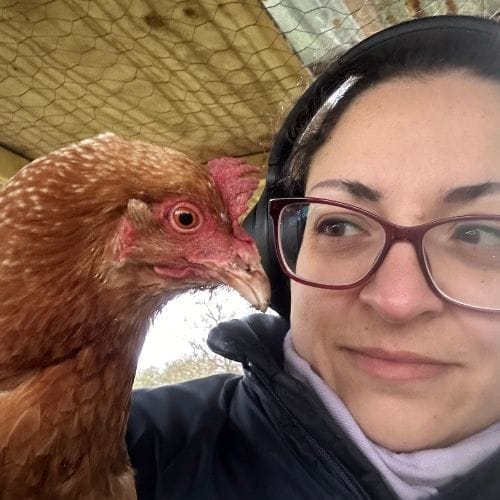
Affiliate Disclosure
Some links on this website are affiliate links.
That means if you click and buy something, I may earn a small commission — at no extra cost to you.
I only recommend things I actually use, love, or would happily hand to a friend while saying, “Trust me.”
Affiliate income helps keep this blog running, the chickens fed, and the espresso flowing ☕🐓
You are never obligated to buy anything through these links — but if you do, grazie mille for supporting this chaotic corner of the internet.
This site uses affiliate links and I may earn a small commission when you use my links and make a purchase without incurring additional fee yourself. Many thanks for supporting this website.
Please click here for more details.
Can Chickens Eat Pecan Nuts When on a Complete Feed? A Nutty Guide to Poultry Nutrition
If you’ve ever caught your chickens eyeing a fallen pecan with suspicious enthusiasm, you’re not alone. As a dedicated chicken keeper, it’s only natural to wonder: Can chickens eat pecans even if they’re already on a complete feed? Whether you’ve got a backyard flock or live near a pecan orchard, let’s crack into the facts and find out if this nutty snack is a wise addition—or just extra calories in a pretty shell.
Can Chickens Eat Pecan Nuts When on a Complete Feed? A Nutty Guide to Poultry Nutrition
What Does “Complete Feed” Actually Mean?
The Foundation of a Healthy Flock
A complete feed is the poultry equivalent of a three-course meal prepped by a nutritionist. It’s scientifically balanced to provide all the vital nutrients your chickens need—think proteins, carbs, fats, vitamins, and minerals—for strong immunity, vibrant feathers, and reliable egg-laying.
This feed is carefully formulated to be your flock’s main dish, and it works best when it isn’t overshadowed by too many snacks or treats.
What’s Inside?
Complete chicken feed often contains:
Amino acids for muscle and feather development
Calcium and vitamin D3 for strong eggshells
B vitamins for metabolism and nerve function
Trace minerals like selenium and zinc
Sometimes extras like omega-3s or probiotics
While it covers all nutritional bases, adding small, healthy treats—like pecans—can provide enrichment and even extra nutrients, if done in moderation.
The Nutritional Scoop on Pecans
Packed with Good Stuff
Pecans are a powerhouse of:
Healthy fats (great for glossy feathers)
Vitamin E (helps fight oxidative stress)
Magnesium and zinc (boost immune health)
Protein and antioxidants
So yes, pecans do bring something to the table—but they’re also energy-dense and high in fat, which means portion control is critical.
How Do Pecans Compare to Other Nuts?
Let’s stack them up:
Nut Type
Safety for Chickens
Noteworthy Info
Pecans
✅ Safe
High fat; shell before serving
Almonds
⚠️ Use caution
Contains oxalates that may affect calcium
Walnuts
⚠️ Risky
Black walnuts can be toxic
Sunflower Seeds
✅ Safe
High in fat but loved by chickens
Pine Nuts
✅ Safe
Expensive but nutritious
In summary: pecans are safe, as long as they’re shelled, plain (unsalted!), and served in tiny portions.
Benefits of Feeding Pecans to Chickens
Improved feather quality – Thanks to their fatty acid content.
Immune support – Antioxidants and trace minerals fortify your flock.
Egg health – Vitamin E may aid in reproductive health and shell quality.
Mental stimulation – Pecking at tasty treats mimics natural foraging.
Treats like pecans offer not just nutrition, but engagement—a mentally enriched chicken is a healthier, happier one.
Risks of Pecans in a Chicken’s Diet
Digestive Issues
Because pecans are rich in fat, too many can overwhelm a chicken’s simple digestive system, potentially causing diarrhea or gut imbalance. Serve sparingly and observe reactions.
Weight Gain
Pecans are calorie bombs. If your chickens start packing on the fluff, reduce treats immediately. Obesity in chickens can lead to:
Joint strain
Lower egg output
Shortened lifespan
Allergic or Toxic Reactions
Although rare, some chickens might react badly to new foods. Always test any new treat (including pecans) in small amounts and observe for:
Lethargy
Changes in droppings
Reduced appetite
Also, never offer moldy, salted, or spiced pecans. These can be toxic and dangerous.
How to Feed Pecans to Chickens Safely
✅ DO:
Shell the nuts completely
Break into small, bite-sized pieces
Feed raw or lightly toasted (no oil or salt)
Offer only 1–2 times per week
Scatter in the run for natural foraging behavior
❌ DON’T:
Give pecans daily
Offer them to baby chicks
Use as a meal replacement
Feed flavored or candied nuts
A good rule of thumb: Treats, including pecans, should make up no more than 10% of a chicken’s total diet.
Pecans vs. Other Healthy Chicken Snacks
Rotate pecans with other flock-friendly favorites like:
Beet greens
Sweet potatoes (cooked)
Bell peppers
Berries
Cabbage leaves
These alternatives keep things interesting and nutritional, without risking excess fat intake.
When Should You Skip Pecans?
Hold off on pecans if:
You’re feeding chicks under 8 weeks (they need simple, soft food)
Your chicken is recovering from illness (stick to core feed)
You’ve noticed weight gain or changes in droppings
Your feed budget is tight—pecans aren’t cheap!
Final Thoughts: Are Pecans Chicken-Approved?
Absolutely—when fed as an occasional, well-prepared treat, pecans can bring both nutrition and joy to your flock. They’re not a replacement for complete feed, but they are a tasty bonus when offered correctly.
So, can chickens eat pecans on a complete feed?
Yes—but keep it light, fresh, and fun. Your girls will thank you with extra-fluffy feathers and clucks of delight.

Zia Paola
Zia Paola is a burnout survivor, chicken enthusiast, and former veterinary surgeon turned digital mischief-maker. She writes from her semi-chaotic smallholding in the UK, where she splits her time between unhinged chickens, rustic recipes, and helping others reclaim their lives from hustle culture. You can find her ranting lovingly about slow living, food, and freelance freedom at www.badinfluenzia.com.

Get mildly chaotic life advice, anti-burnout rants, and unsolicited chicken wisdom delivered straight to your inbox. No fluff. Just feathers.
Created with ©systeme.io



